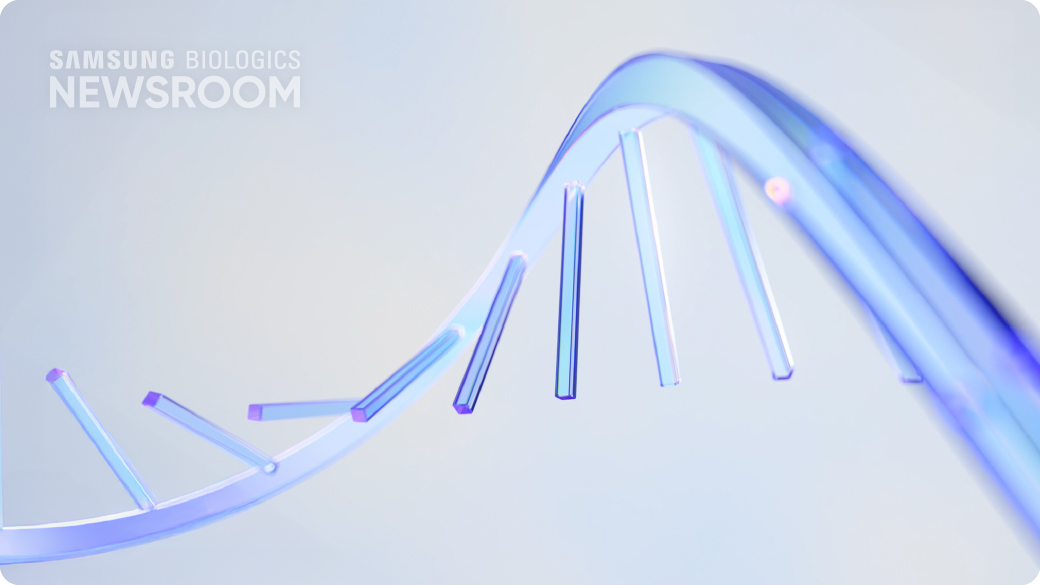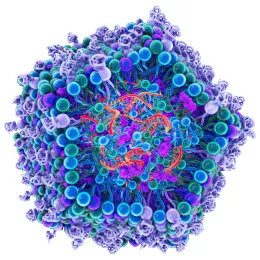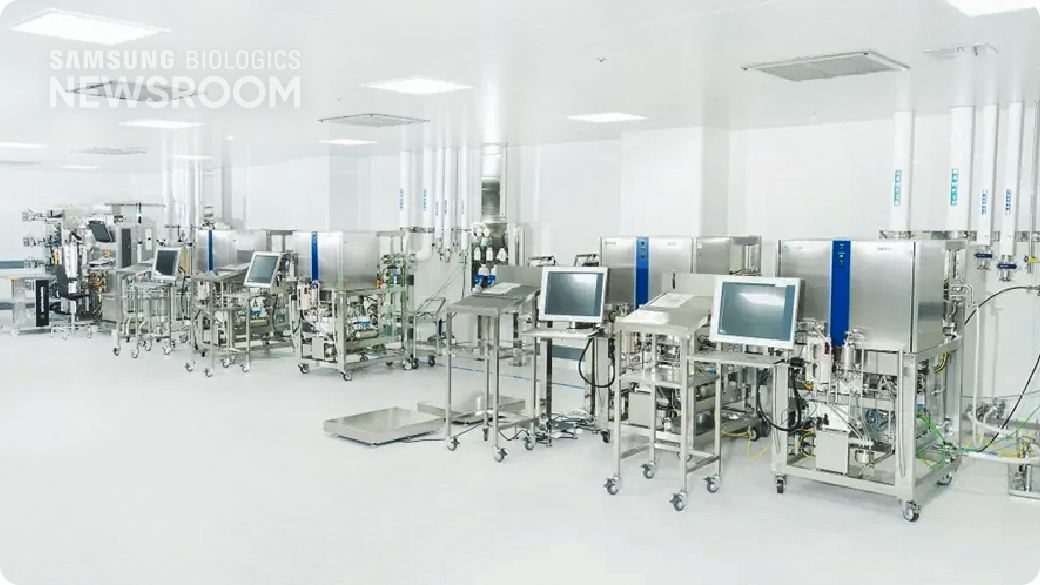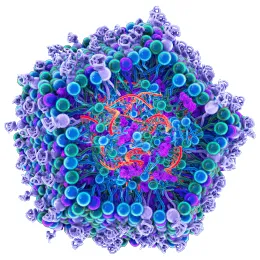Samsung Biologics provides clients with the flexibility to navigate clinical and commercial stages of complex modalities, including mRNA therapeutics.
Therapeutic agility harnessed
“The vision is to help our clients develop mRNA vaccines and therapeutics that can ultimately be effective for various antigens and variants with greatest coverage,” says Sungyul Lee, Head of the Gene Therapy Technology Lab at Samsung Biologics. Thanks to the easily code-able nature of an mRNA therapeutic, there can be quick turnaround for developing new vaccines for rapidly evolving diseases such as the flu.

Lee highlights the strength of self-amplifying RNAs (saRNAs) as being able to achieve the same vaccine efficacy as traditional mRNA vaccines with a fraction of the usual dose. Samsung Biologics is committed to scaling up research and development of saRNA drug substance. In the face of falling protective immunity within three to six months after flu vaccine administration, low-dose saRNA vaccines can offer the global health landscape the needed agility alongside prolonged clinical effectiveness.
Lipid nanoparticle ecosystem
In addition to saRNA technologies, effective and safe lipid nanoparticles (LNPs) that deliver mRNAs into targeted regions of the patient body through encapsulation and receptor-mediated endocytosis are key. Samsung Biologics is actively collaborating with LNP platform companies to support global biotechs.
 A CDMO that makes for an integral partner in mRNA manufacturing and development has extensive experience with formulation using diverse excipients for LNPs. According to Hyukjin Lee, Professor at Seoul National University who gave a lecture in January as part of the Samsung Biologics Biotechnology Advisory Board, the remaining tasks in LNP development are twofold: to mitigate any adverse effects in the body, and to readily eliminate LNPs once their job is done, safely making way for possible repeated administration.
A CDMO that makes for an integral partner in mRNA manufacturing and development has extensive experience with formulation using diverse excipients for LNPs. According to Hyukjin Lee, Professor at Seoul National University who gave a lecture in January as part of the Samsung Biologics Biotechnology Advisory Board, the remaining tasks in LNP development are twofold: to mitigate any adverse effects in the body, and to readily eliminate LNPs once their job is done, safely making way for possible repeated administration.
Samsung Biologics is setting up efficient delivery platforms by investing in and collaborating with LNP platform companies through the Samsung Life Science Fund. Haenaem Mac Kwon, Director of the mRNA technology Group, says Samsung Biologics takes this win-win approach to optimize the mRNA drug substance and LNP drug product manufacturing for clients.
Additionally, research is well underway for LNP formulations that can be stored at room temperature or refrigerated. This new approach increases the stability of LNPs for mRNA drugs, in turn providing more options of the lipid pool for clients.
Looking toward a universal vaccine
Lee imagines a cancer vaccine that is personalized to each patient, tackling rare diseases using CRISPR technology alongside mRNA therapies. By first succeeding in developing a universal saRNA vaccine for handling diverse antigenic variants, the technology could be adapted to educate the immune system for neoantigens in the patient body. “Each mutation is different in each patient,” he says.

From plasmid DNA linearization and purification to encapsulation, aseptic fill-finish, and cold chain storage, Samsung Biologics offers one-stop manufacturing as well as bioanalytical services alongside research and development.
“We’re keen to partner with mRNA biotechs as well as LNP platform companies to bring vaccines and therapeutics to clients worldwide,” says Kwon. “Let’s work together to tackle more disease mechanisms with new modalities.”
Related contents
Samsung BIO Insight The Power of One I Samsung Biologics’ mRNA Capabilities
Whitepapers Optimized residual dsRNA detection for mRNA therapeutics
Whitepapers Ultra-cold chain and supply chain management strategies for mRNA
Samsung Biologics provides clients with the flexibility to navigate clinical and commercial stages of complex modalities, including mRNA therapeutics.
Therapeutic agility harnessed
“The vision is to help our clients develop mRNA vaccines and therapeutics that can ultimately be effective for various antigens and variants with greatest coverage,” says Sungyul Lee, Head of the Gene Therapy Technology Lab at Samsung Biologics. Thanks to the easily code-able nature of an mRNA therapeutic, there can be quick turnaround for developing new vaccines for rapidly evolving diseases such as the flu.

Lee highlights the strength of self-amplifying RNAs (saRNAs) as being able to achieve the same vaccine efficacy as traditional mRNA vaccines with a fraction of the usual dose. Samsung Biologics is committed to scaling up research and development of saRNA drug substance. In the face of falling protective immunity within three to six months after flu vaccine administration, low-dose saRNA vaccines can offer the global health landscape the needed agility alongside prolonged clinical effectiveness.
Lipid nanoparticle ecosystem
In addition to saRNA technologies, effective and safe lipid nanoparticles (LNPs) that deliver mRNAs into targeted regions of the patient body through encapsulation and receptor-mediated endocytosis are key. Samsung Biologics is actively collaborating with LNP platform companies to support global biotechs.

A CDMO that makes for an integral partner in mRNA manufacturing and development has extensive experience with formulation using diverse excipients for LNPs. According to Hyukjin Lee, Professor at Seoul National University who gave a lecture in January as part of the Samsung Biologics Biotechnology Advisory Board, the remaining tasks in LNP development are twofold: to mitigate any adverse effects in the body, and to readily eliminate LNPs once their job is done, safely making way for possible repeated administration.
Samsung Biologics is setting up efficient delivery platforms by investing in and collaborating with LNP platform companies through the Samsung Life Science Fund. Haenaem Mac Kwon, Director of the mRNA technology Group, says Samsung Biologics takes this win-win approach to optimize the mRNA drug substance and LNP drug product manufacturing for clients.
Additionally, research is well underway for LNP formulations that can be stored at room temperature or refrigerated. This new approach increases the stability of LNPs for mRNA drugs, in turn providing more options of the lipid pool for clients.
Looking toward a universal vaccine
Lee imagines a cancer vaccine that is personalized to each patient, tackling rare diseases using CRISPR technology alongside mRNA therapies. By first succeeding in developing a universal saRNA vaccine for handling diverse antigenic variants, the technology could be adapted to educate immune system for neoantigens in the patient body. “Each mutation is different in each patient,” he says.

From plasmid DNA linearization and purification to encapsulation, aseptic fill-finish, and cold chain storage, Samsung Biologics offers one-stop manufacturing as well as bioanalytical services alongside research and development.
“We’re keen to partner with mRNA biotechs as well as LNP platform companies to bring vaccines and therapeutics to clients worldwide,” says Kwon. “Let’s work together to tackle more disease mechanisms with new modalities.”
Related contents
Samsung BIO Insight The Power of One I Samsung Biologics’ mRNA Capabilities
Whitepapers Optimized residual dsRNA detection for mRNA therapeutics
Whitepapers Ultra-cold chain and supply chain management strategies for mRNA
- CDO
- CGMP
- ADC
- Bio Campus
- IR
- CMO
Share article